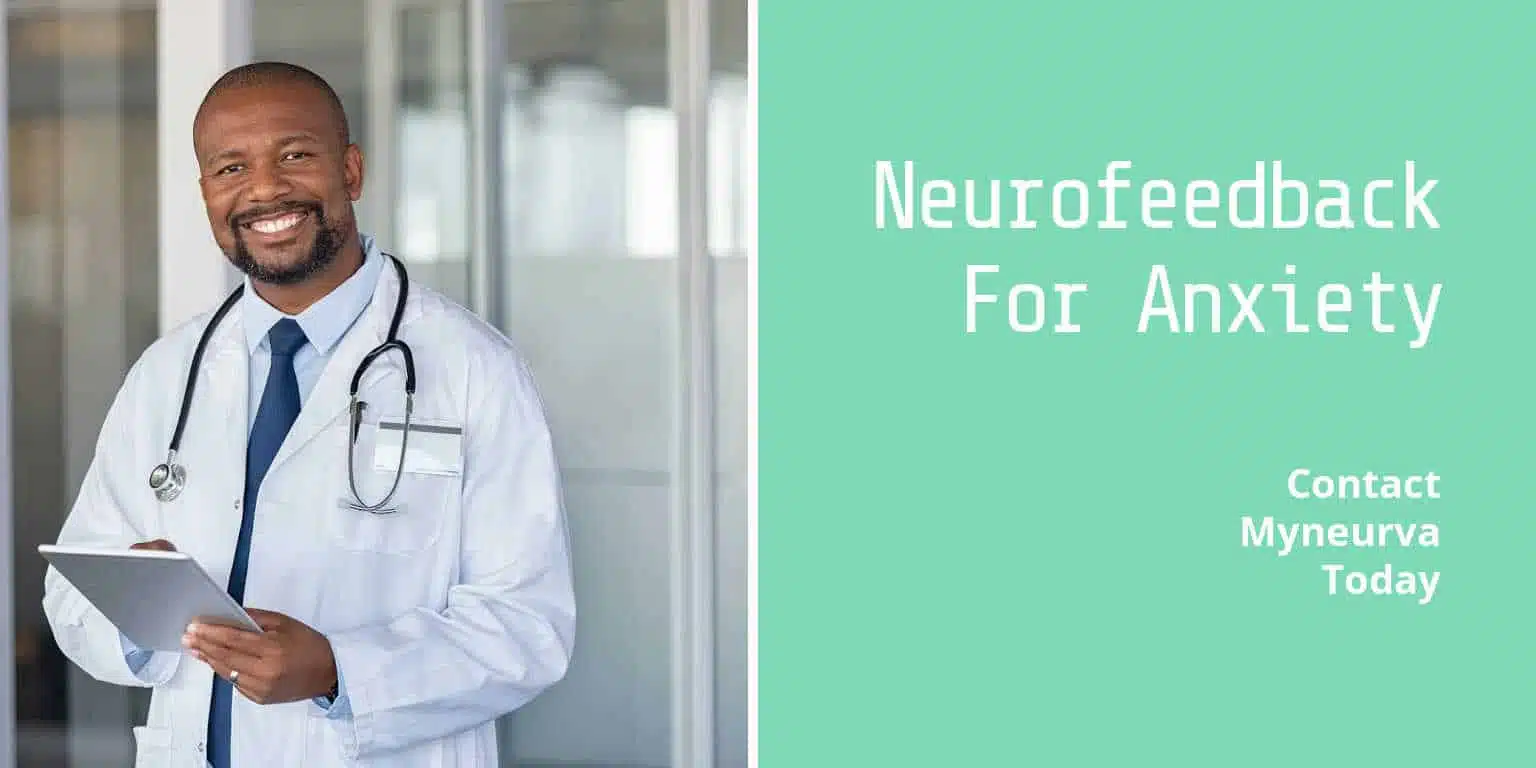Neurofeedback For Anxiety
Neurofeedback can work for anxiety by retraining your brain to learn how to relax again.
Table Of Contents
- Does Neurofeedback Work For Anxiety
- How does Neurofeedback Help Anxiety
- What Is Anxiety
- Can Neurofeedback Cure Anxiety
- How Many Neurofeedback Sessions Are Recommended For Anxiety
- Is Anxiety A Mental Disorder
- Are Anxiety And Depression The Same
- What Are The Different Types of Anxiety Disorders
- What Does Anxiety Feel Like
- What Are The Symptoms Of Anxiety
- How Does Anxiety Affect You
- What Is The Traditional Treatment For Anxiety
- Is Neurofeedback An Alternative Therapy For Anxiety
- Will Anxiety Go Away Without Treatment
- Neurofeedback Anxiety Research

Download The PDF
Download the Neurofeedback Anxiety pdf
Does Neurofeedback Work For Anxiety?
Yes, Neurofeedback can work for anxiety by retraining your brain to learn how to relax again. Neurofeedback is a non-invasive, alternative therapy for anxiety that helps reduce feelings of dread and foreboding.
Neurofeedback has been effectively used for decades to reduce many symptoms of anxiety. To learn more about neurofeedback please read the article; What Is Neurofeedback.
How does Neurofeedback Help Anxiety?
Neurofeedback uses your brain’s natural ability to learn new things to help it self-regulate. From a branch of psychology known as behaviorism, neurofeedback uses a system of audio and visual feedback to retrain your brain and bring it back into balance.
When beta brain waves are too high (indicative of anxious-type thoughts), the audio and visual inputs grow dim. The dimness causes your brain to return its focus to the video. This process happens hundreds of times per minute over a typical 50-minute training session. Over time your brain learns to “stay within the lines” even when you’re not training.
Neurofeedback training is an all-natural approach that can create long-term changes in brain function. These changes go to the source – imbalanced brain waves in the brain.
What Is Anxiety?
Anxiety is a feeling. Generalized Anxiety Disorder is a common psychological condition that can run in families and may be triggered by stress. Children may develop anxiety disorders, and women are more prone to the condition than men.
The Diagnostic and Statistical Manual of Psychiatry classifies Generalized Anxiety Disorder (GAD) as a psychiatric disorder. Like most psychiatric disorders, it is considered a lifelong condition. Generalized Anxiety Disorder is different from feeling anxious, just like Major Depressive Disorder is different from feeling depressed.
Individuals who suffer from Generalized Anxiety Disorder experience excessive dread and worry for six months or more. They also experience other complaints such as fatigue, sleep disturbance, muscle tension, and irritability.
Those with Generalized Anxiety Disorder suffer greatly and may develop substance use disorders and major depression. Long term Generalized Anxiety Disorder is associated with a shortened lifespan due to allostatic overload of the sympathetic nervous system.
Can Neurofeedback Cure Anxiety?
Neurofeedback cannot cure Generalized Anxiety Disorder. Peer-reviewed research has demonstrated that practitioners can use neurofeedback in phobic and psychiatric populations to decrease thoughts, behaviors, and emotional complaints associated with Generalized Anxiety Disorder.
How Many Neurofeedback Sessions Are Recommended For Anxiety?
Neurofeedback for anxiety typically requires 20 sessions. Depression often requires about 25-30 sessions, and OCD may require 30-50 sessions. All you have to do for your neurofeedback training is to sit back, relax, and watch a movie or video.
While doing this, the computer measures your brainwave output using small sensors placed on your scalp. The sensors tell the computer when your brainwaves are outside the desired range, based on your brain map.
Is Anxiety A Mental Disorder?
Generalized Anxiety Disorder is a mental disorder. Anxiety is a feeling.
Are Anxiety And Depression The Same?
Although many people with anxiety also suffer from depression, they are two different conditions.
What Are The Different Types of Anxiety Disorders?
Anxiety disorders include subtypes of mental disorders such as;
- Generalized anxiety disorders
- Simple phobias
- Obsessive-compulsive disorder (OCD)
- Panic disorders
- Post-traumatic stress disorders (PTSD)
- Social anxiety disorder
What Does Anxiety Feel Like?
People experience anxiety differently, and not everyone who has anxiety feels anxious. People with anxiety can exhibit nervous behaviors, habits, or thoughts. Anxiety generally feels like having a pit in your stomach all the time, thoughts racing, sleeplessness, and constant fatigue.
What Are The Symptoms Of Anxiety?
The characteristics of anxiety include unrealistic worry and tension, often when there is little or no cause. These worries typically bounce from one problem to another, like family, work problems, health, finances, and more. The fears experienced are often challenging to control and may lead to severe distress.
Symptoms may include difficulty concentrating, tiredness, irritability, sleep problems, jumpiness or restlessness, and palpitations. Physical symptoms may include headaches, muscle weakness, palpitations, stomach upsets, and nausea.
How Does Anxiety Affect You?
Besides the short and medium-range effects of Generalized Anxiety Disorder on day-to-day functions, research shows that long-term Generalized Anxiety Disorder is associated with ulcers, cardiovascular disease, memory problems, substance use, diabetes, asthma, and decreased life expectancy.
What Is The Traditional Treatment For Anxiety?
There is a large amount of research focused on functional brain abnormalities associated with anxiety. Traditional therapy and medication remain the gold standards for the treatment of Generalized Anxiety Disorder.
Electroencephalographic (EEG) neurofeedback is a promising methodology for retraining abnormal brain wave patterns. Neurofeedback has been associated with minimal side effects and is less invasive than other methods that address brain disorders.
Is Neurofeedback An Alternative Therapy For Anxiety?
Yes, neurofeedback is an alternative and complementary therapy for anxiety. Neurofeedback can assist as an adjunct treatment for many psychological conditions, including anxiety, depression, post-traumatic stress disorder (PTSD), and attention deficit hyperactivity disorder (ADHD).
Will Anxiety Go Away Without Treatment?
Most likely not. It may ebb and flow throughout the lifespan. Still, until adequately controlled, it will not go away but have a relapsing and remitting course.
Reach Your Peak Potential With Myneurva
Common Neurological Disorders
Meet Your Neurofeedback Expert
Featured Neurofeedback Articles
Call Us
Hours
M-F: 7am - 5pm EST
S-S: Closed

